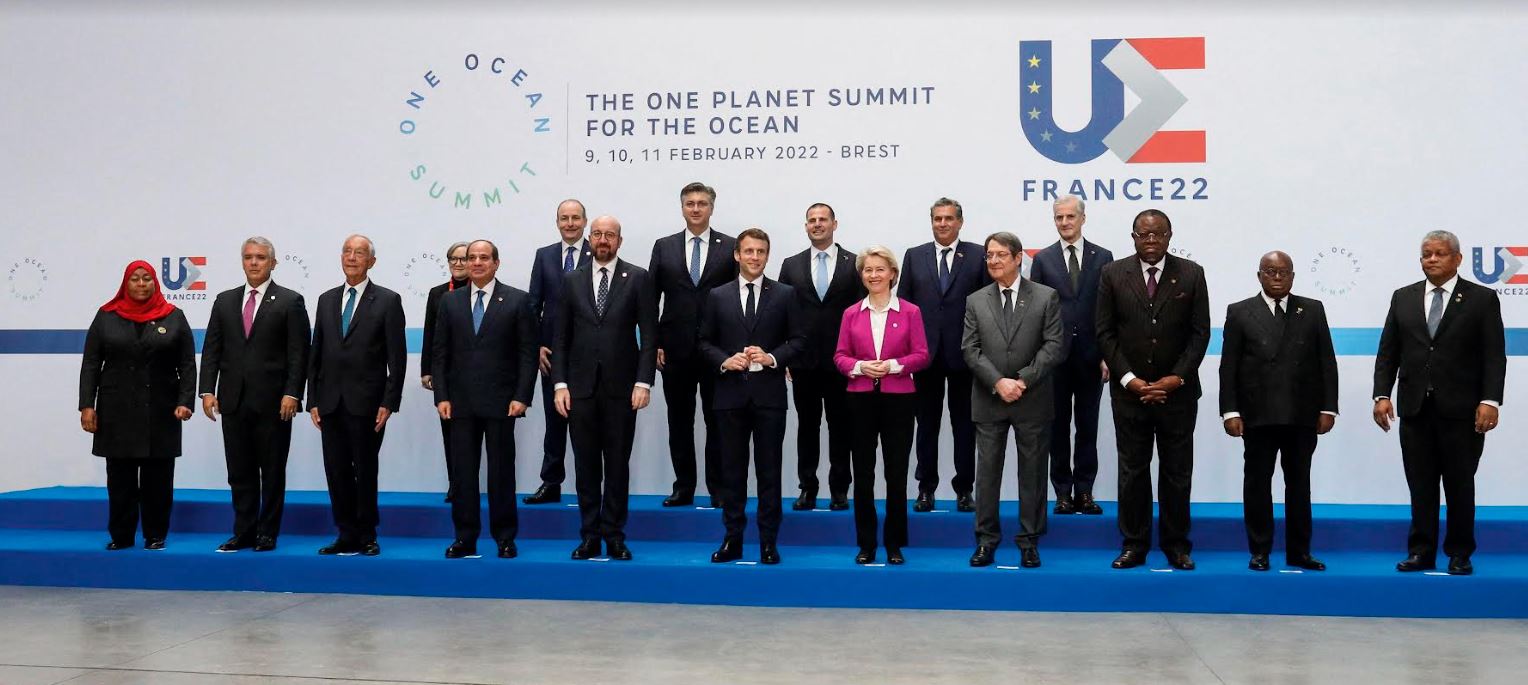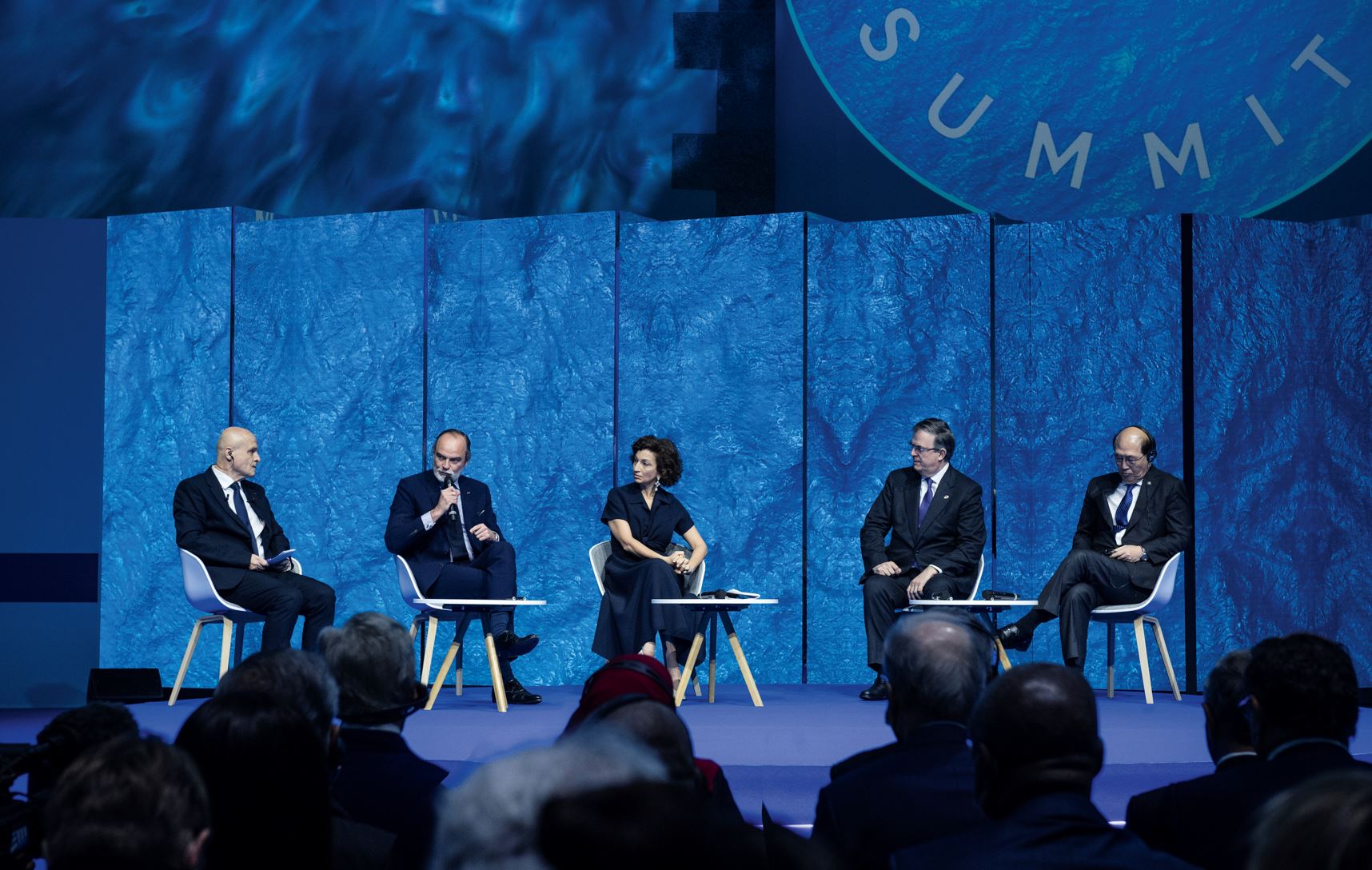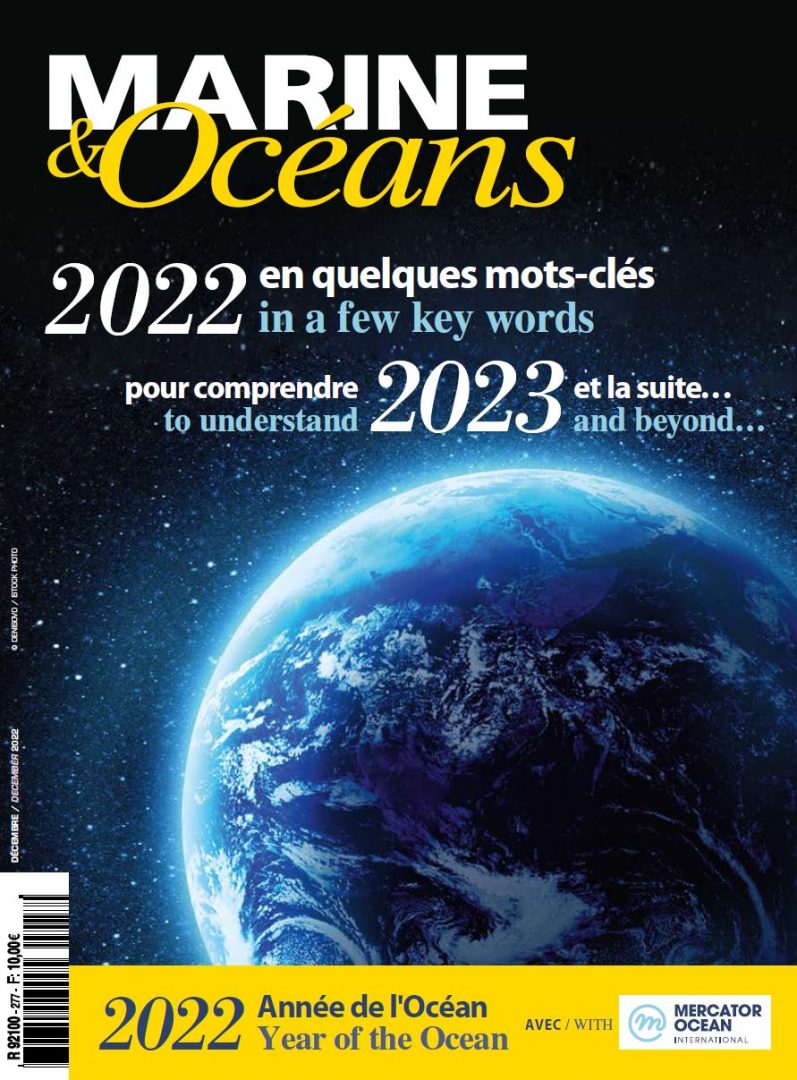According to Olivier Poivre d’Arvor, French Ambassador for the Poles and Maritime Issues and special envoy of the French President, the One Ocean Summit held in Brest from 9 to 11 February has revealed the mobilizing capacity of France on ocean issues. Interview by Eugénie Tiger.
* * *
If there were only one thing to retain from this Ocean Summit, what would it be?
For the first time ever, 41 of the world’s most influential heads of state and government gathered around the table of a major ocean coalition, including the United States, China, India, Indonesia, Japan, the major maritime countries of the European Union, the United Kingdom… – it should be noted that Russia was absent. Such a mobilization constitutes a major inflection with regards to the quasi-absence of collective international concern for the sea in negotiations on climate or biodiversity. The sea can no longer be a side-event of the various COPs! It is also the first time that a country addresses the issue of the ocean at this level as part of the presidency of a Member State of the European Union, with the support of the United Nations. Through the strong and very personal commitment of the President of the Republic, the support of many ministers and the efforts of our diplomatic network, France wishes to assert its leadership in terms of ocean issues at the European and global levels.

Which most notable announcements should be retained from this summit?
The measures announced in Brest are unique in that they are both realistic and achievable in a short time. To set the pace, France has made the commitment that 30% of its exclusive economic zones (EEZs) will become marine protected areas by 2022, and not by 2030. We also announced the treatment of hazardous waste sites located on our coastal areas. Concerning sustainable fisheries, we secured the necessary number of ratifying states so that the Cape Town Agreement on the Safety of Fishing Vessels worldwide can be implemented this year. In addition, France and the United States signed a commitment calling for the negotiation of a treaty banning the production of single-use plastics, a strong signal in the fight against pollution. Two weeks later, in Nairobi, at the UNEP (United Nations Environment Programme) conference, nations agreed to sign a legally binding treaty…
Meanwhile, still in Brest, 40 major European harbours made a commitment to accelerate the electrification of their facilities to further decarbonize their activities, while two of the world’s largest container carriers joined the Green Marine Europe label.
How do you respond to those who argue that France is choosing the easiest path by extending the surface of its marine protected areas in little-frequented regions, such as the Southern Territories, rather than in saturated areas like the Mediterranean?
When you own an EEZ of more than 11 million square kilometers, the second largest in the world, protecting as much of it as possible is a clear sign of a strong concern. On this issue, we are far ahead of many other countries. The French overseas territories, through French Polynesia or the French Southern and Antarctic Territories, have shown their ambition.
Regarding more specifically the Mediterranean, with 21 countries bordering this sea, we are far from being the only ones who need to assume their responsibilities… There, as in other areas, the idea is thus to act wisely, taking into account local realities, to avoid that bans or moratoria lead to the collapse of an entire economy on which nearly 150 million people depend, and obviously to protect the biodiversity of a sea that is now seriously weakened, saturated and polluted.
In Brest, President Emmanuel Macron confirmed the launch of large-scale missions for the exploration of the seabed, which worries some associations for the protection of biodiversity.
We are talking about scientific exploration. The type of exploration that will allow researchers to map and understand what is going on in the ocean in order to better address its issues. For it is scientific research that allows our governments to make informed and constructive decisions. It is therefore important to reassure those who may be worried. Let me remind you that the International Seabed Authority, an intergovernmental organization, was created almost thirty years ago, following the Convention on the Law of the Sea, to strictly control any project with an economic purpose. Multilateralism is the guarantee of concerted and transparent decisions.
The Bloom association has considered this summit to have failed, particularly on the issue of overfishing. How do you respond?
My answer is that you won’t rule the world’s fate by pronouncing anathemas that eventually lead to your exclusion. That instead of defensiveness, we choose action. As a major issue, overfishing has been given special attention in Brest, including in exchanges with NGOs.
Overfishing, which should not be confused with IUU (illegal, unreported and unregulated) fishing, no less ethical, is in complete contradiction with our vision of sustainable fishing. Through international fisheries management organizations, balances are being set. We are also seeking to form alliances to fight against pirate fisheries. And at the same time, we need to classify a certain number of marine reserves, hence our decision to protect 30% of our EEZ.
Control in harbours must be reinforced, something that we are already actively doing in France. Let us keep in mind, moreover, that negotiations are currently underway at the World Trade Organization on the possible suppression of certain damaging subsidies, which legally allow the financing of large vessels responsible for overfishing.

One of the highlights of the summit was the signing, by France and five other European countries, of the Brest Declaration initiating the transformation of the Toulouse-based structure Mercator Ocean International, which is notably involved in the creation of a Digital Twin of the Ocean, into an intergovernmental organization. What is at stake in this initiative?
The first thing I note is that the European Commission, in the person of President Von der Leyen, has committed itself to financing a Digital Twin of the Ocean accessible to all. This is one of the very good things to come out of this summit.
In this regard, President Macron expressed his gratitude to the European Starfish mission chaired by Pascal Lamy. In order to designate the operator who will be able to implement this project, a call for tenders will be launched. In this context, Norway, the United Kingdom, Germany, Spain and Italy have joined France in signing the Brest Declaration. With twenty years of experience and a considerable lead on the subject of the digital twin of the ocean, Mercator Ocean International is now a structure of European scope, capable of supporting EU initiatives in terms of international ocean governance.
Are there any guarantees that the commitments made in Brest will be fulfilled?
The commitments made in Brest have been published in complete transparency. They are challenging but we will achieve them, and in a short time. Each of the Brest commitments is supported by relevant actors or operators, whether it be the French Development Agency, private entrepreneurs or, of course, specific ministries.
The French Secretary of State for Biodiversity, Bérangère Abba, went to Nairobi to ensure the follow-up of our commitment. I am currently in New York (1) together with Barbara Pompili, the Minister of Ecological Transition, to lead the coalition for the High Seas in the framework of the BBNJ negotiations (2), which, since the One Ocean Summit, has brought together over 45 countries. Over the coming months, we will make sure that all the Brest commitments are fulfilled.
This summit opened 2022 with the seal of the Ocean. What are the main upcoming events and what role will France play in this context?
Next to the New York Intergovernmental Conference on Marine Biodiversity beyond National Jurisdiction (BBNJ) and the COP on Biodiversity in Kunming, China, from April 25 to May 8, one of the most important meetings will be the United Nations Conference on the Oceans, due to take place in Lisbon from June 27 to July 1, with the entire international community gathered at the same table.
The French approach is still that of a positive and rapid construction. To support this vision, we hope that France will be able to host the next United Nations conference on the oceans in 2025.
As the 2015 COP gave birth to the Paris Agreements, we want, ten years later, to make this conference a turning point, bringing together and mobilizing States, companies and non-governmental organizations. We want it to commit us all to concrete protection and development criteria, based on strong and constantly updated scientific foundations. In Brest, we initiated a momentum to truly build the future of an ocean that is vital for our stability, but which is now really threatened, including through the geopolitical turmoil we are facing.
- This interview was completed on March 9, 2022.


